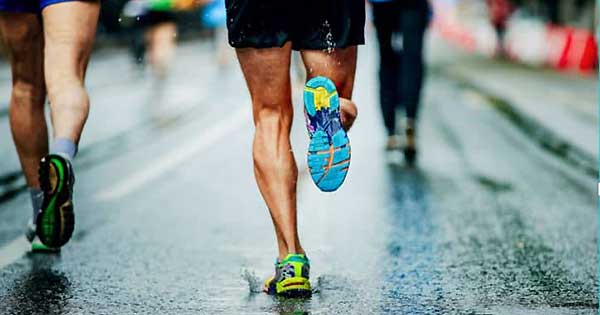The week after the marathon is the most anticipated and enjoyable week, which is something I always look forward to. In this article I show you how I spend my week after the marathon, putting all my energy and focus into recovery. Yes, because this is the best time to relax, recover and reset.

First congratulations on finishing your marathon, now is the time to focus on recovery, especially after running so many miles where the body goes through physical stress and muscle wear and tear. Now is the time to rehydrate and refuel.
How to recover quickly from a marathon.
Recovery is often neglected and paying close attention to it can help us get out of post-marathon soreness in no time. Our body usually recovers within 3 days of the marathon without undermining the fact that every runner’s body is different and recovery time can vary from person to person.
You can hit the ground running with some training performance compression socks that help speed recovery. Wear them during your training runs and also on the day of the marathon, if you wish.
Here are some important recovery tips you may want to consider after running your marathon.
Tips
- Post-race, keep moving after completing your marathon for 5-10 minutes to get rid of stiffness and gradually bring your heart rate back to a resting state.
- Rehydrate with an energy drink or electrolyte.
- It would be ideal if you could change into dry clothes.
Stretches that help recover after the marathon
Do some light stretching of the core group of muscles that must have been through severe strain and tear. Gently stretch your quads, glutes, calf, IT band, back, and inner thighs for at least 15 minutes. With 20 seconds of stretching in each and every one of the muscles.
Use a foam roller to release all tight spots and fascia and stretch for another 10 minutes if you can, especially lying down is recommended.
Feeding
Recharge with a healthy breakfast containing protein and carbohydrates in 30 minutes. The sample diet can be eggs, peanut butter, whole wheat bread, banana, fruit, oatmeal, coconut water, nuts, and raisins.
Be sure to hydrate at frequent intervals throughout the day to compensate for the colossal loss of water and fluids your body has been undergoing during the entire time you’ve run a marathon.
Some tricks to recover quickly from a marathon.
Taking an ice bath definitely reduces all the inflammation and helps in speedy recovery. If an ice bath is not possible, apply ice to your core muscle group.
You can take a cold shower and wear compression recovery socks for 24 hours, which helps speed recovery, improves circulation and lactate clearance after activity.
This also helps in a situation where you need to travel after a marathon. I tell you that I just started using them and I find them very useful. Rest for an hour or two, do not stand up.
What to do every day after a marathon.
1st day
On the 1st day I recommend you go to a SPA and get a massage, avoid deep tissue massage as your muscles would be sensitive, therefore a vigorous massage can do more damage than relax your muscles. Celebrate and keep moving, keep walking, eat well.
At night, before going to sleep, use a foam roller, stretch the muscles that are specifically tense for 5-10 minutes and take a hot shower, not only will you sleep well, but you will wake up with minimal pain.
2nd day
The next day, in addition to eating a high-protein diet and focusing on recovery through a healthy diet of carbohydrates and protein, repeat the roll and stretch morning and night, focus on active recovery, such as walking or swimming. to remove lactate. Try to have a quiet day.
3rd day
On the third day do some dynamic warm-up and light exercises followed by a walk. Continue rolling and stretching morning and evening.
4th day
On the fourth day you are ready to do a slow jog of no more than 3-5 km with warm -up and post-jog stretching.
5th day and later
By this day you will have fully recovered. You can now continue cross-training and keep your running mileage low and gradually improve over a 2-3-week period. A few weeks of low mileage won’t affect your fitness level, in fact, on the contrary, it will make you stronger for your next challenge, keeping your injury free, feeling good and enjoying yourself.
If you have a different post-marathon experience, or any other useful advice to give us, go ahead and share your criteria with us in the comments.










